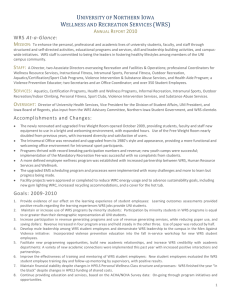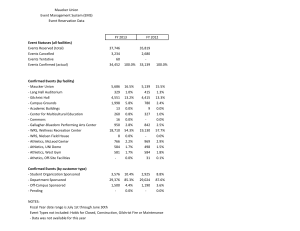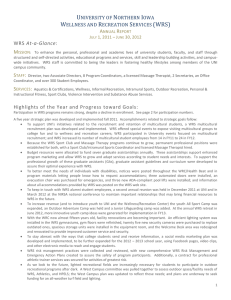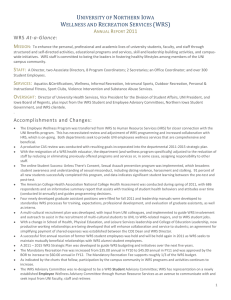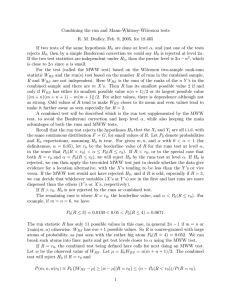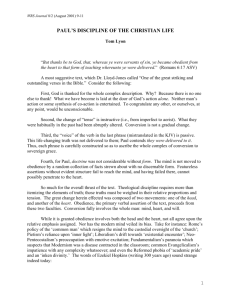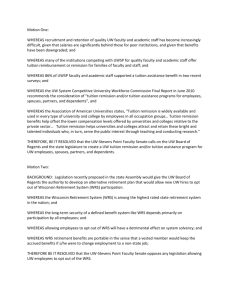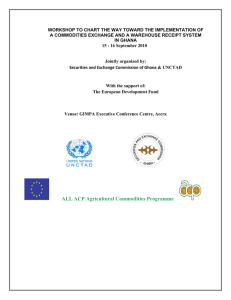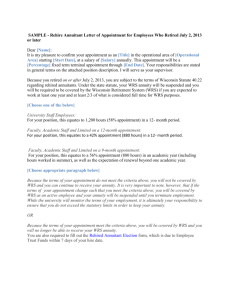U N I
advertisement
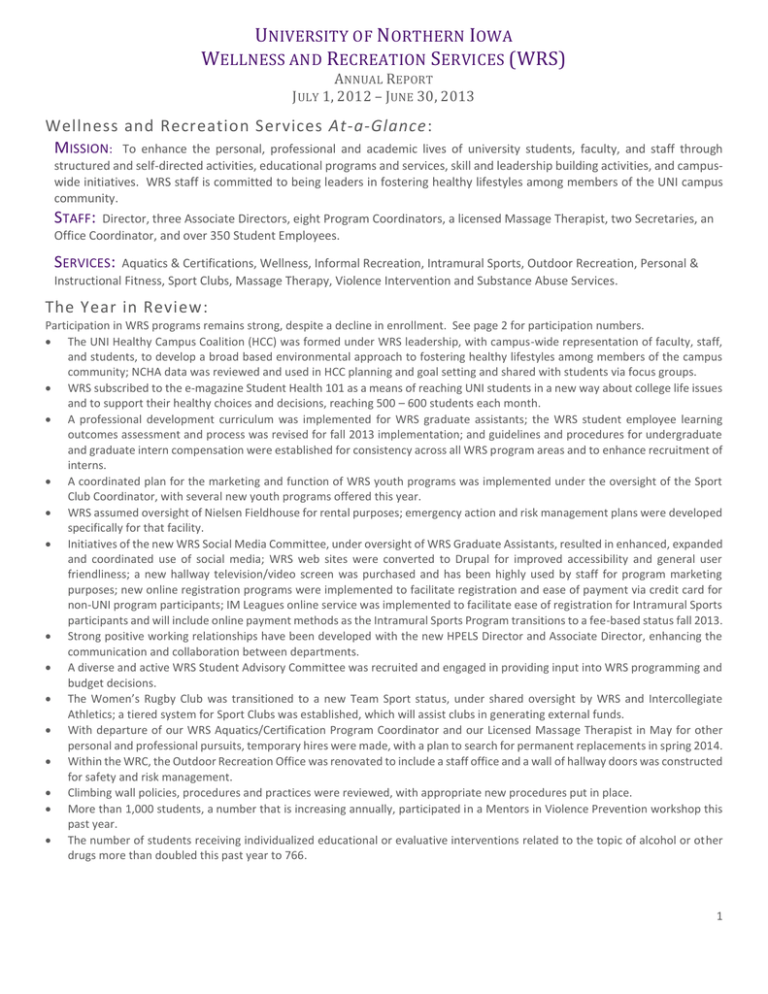
UNIVERSITY OF NORTHERN IOWA WELLNESS AND RECREATION SERVICES (WRS) ANNUAL REPORT JULY 1, 2012 – JUNE 30, 2013 Wellness and Recreation Services At-a-Glance: MISSION: To enhance the personal, professional and academic lives of university students, faculty, and staff through structured and self-directed activities, educational programs and services, skill and leadership building activities, and campuswide initiatives. WRS staff is committed to being leaders in fostering healthy lifestyles among members of the UNI campus community. STAFF: Director, three Associate Directors, eight Program Coordinators, a licensed Massage Therapist, two Secretaries, an Office Coordinator, and over 350 Student Employees. SERVICES: Aquatics & Certifications, Wellness, Informal Recreation, Intramural Sports, Outdoor Recreation, Personal & Instructional Fitness, Sport Clubs, Massage Therapy, Violence Intervention and Substance Abuse Services. The Year in Review: Participation in WRS programs remains strong, despite a decline in enrollment. See page 2 for participation numbers. The UNI Healthy Campus Coalition (HCC) was formed under WRS leadership, with campus-wide representation of faculty, staff, and students, to develop a broad based environmental approach to fostering healthy lifestyles among members of the campus community; NCHA data was reviewed and used in HCC planning and goal setting and shared with students via focus groups. WRS subscribed to the e-magazine Student Health 101 as a means of reaching UNI students in a new way about college life issues and to support their healthy choices and decisions, reaching 500 – 600 students each month. A professional development curriculum was implemented for WRS graduate assistants; the WRS student employee learning outcomes assessment and process was revised for fall 2013 implementation; and guidelines and procedures for undergraduate and graduate intern compensation were established for consistency across all WRS program areas and to enhance recruitment of interns. A coordinated plan for the marketing and function of WRS youth programs was implemented under the oversight of the Sport Club Coordinator, with several new youth programs offered this year. WRS assumed oversight of Nielsen Fieldhouse for rental purposes; emergency action and risk management plans were developed specifically for that facility. Initiatives of the new WRS Social Media Committee, under oversight of WRS Graduate Assistants, resulted in enhanced, expanded and coordinated use of social media; WRS web sites were converted to Drupal for improved accessibility and general user friendliness; a new hallway television/video screen was purchased and has been highly used by staff for program marketing purposes; new online registration programs were implemented to facilitate registration and ease of payment via credit card for non-UNI program participants; IM Leagues online service was implemented to facilitate ease of registration for Intramural Sports participants and will include online payment methods as the Intramural Sports Program transitions to a fee-based status fall 2013. Strong positive working relationships have been developed with the new HPELS Director and Associate Director, enhancing the communication and collaboration between departments. A diverse and active WRS Student Advisory Committee was recruited and engaged in providing input into WRS programming and budget decisions. The Women’s Rugby Club was transitioned to a new Team Sport status, under shared oversight by WRS and Intercollegiate Athletics; a tiered system for Sport Clubs was established, which will assist clubs in generating external funds. With departure of our WRS Aquatics/Certification Program Coordinator and our Licensed Massage Therapist in May for other personal and professional pursuits, temporary hires were made, with a plan to search for permanent replacements in spring 2014. Within the WRC, the Outdoor Recreation Office was renovated to include a staff office and a wall of hallway doors was constructed for safety and risk management. Climbing wall policies, procedures and practices were reviewed, with appropriate new procedures put in place. More than 1,000 students, a number that is increasing annually, participated in a Mentors in Violence Prevention workshop this past year. The number of students receiving individualized educational or evaluative interventions related to the topic of alcohol or other drugs more than doubled this past year to 766. 1 WRC & Health Beat Total Visits 2012/2013 282,545 2011/2012 274,934 2012/2013 20,206 2,314 2011/2012 28,487 2,888 2012/2013 Trip participants 294 Belay Clinic Participants 212 Rentals 464 Climbing Wall Usage (monthly average ) Academic year 1,816 Summer 352 2011/2012 244 203 461 Total Participations Unique Students Unique Users Students Faculty/Staff Others 8,166 203 194 8,676 215 177 Sports Clubs Number of Clubs Club Members Intramural Sports 2012/2013 27 495 2011/2012 21 489 2012/2013 2011/2012 Fitness/Leisure Classes Outdoor Recreation 1,921 241 Personal Training Total Sessions 2012/2013 1,304 2011/2012 1177 Students Faculty/Staff/Other 26 40 29 39 Total Registered Fall Spring Summer Total 913 1,017 139 2,069 1,001 982 122 2,105 793 880 47 869 843 44 WRS Facility Rentals 132 139 78 Gross Income (Youth Camp income moved to Sport Clubs) Net Income Unique Unique Students Fall Spring Summer 2012/2013 Unique Faculty/Staff/Other Fall Spring Summer 120 137 92 Mentors in Violence Prevention Workshops Individualized alcohol or other drug Education or evaluative intervention Learn-to-Swim: Children of Students, Faculty Staff & Alumni Massages: Red Cross Training: Multi-Cultural Student Employees 2012/2013 2011/2012 1369 935 766 356 652 668 880 874 798 859 31 24 2011/2012 $102,064 $105,635 $55,942 $55,478 2
